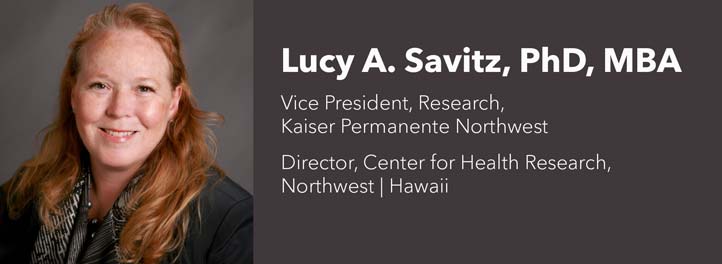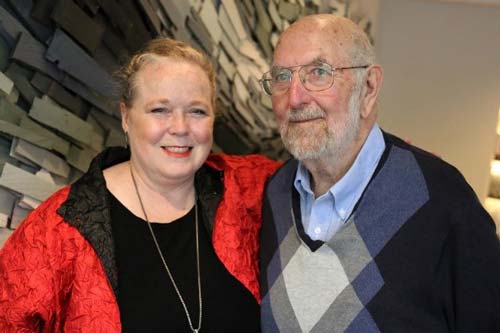One Year In, CHR Director Lucy Savitz Is Focused on the Future
Stories - Jul 24 2018

In May 2017, for only the third time in its 53-year history, the Kaiser Permanente Center for Health Research (CHR) welcomed a new director. In the year since, Lucy A. Savitz, PhD, MBA, has both familiarized herself with CHR’s long history and set a course for the future with a new three-year strategic plan.
From her office in Portland, Oregon, Dr. Savitz has worked closely with health plan and medical group leaders in her dual role as vice president for research at Kaiser Permanente Northwest and as director of CHR (which includes the Kaiser Permanente Hawaii research center). In addition to traveling domestically and abroad speaking, collaborating, and forging relationships, she continues to lead national policy discussions, conduct research, and serve on prestigious advisory boards.
In addition to leading CHR, Dr. Savitz holds an affiliate professor position at the Oregon Health & Science University–Portland State University School of Public Health, where she guest lectures in the Health Systems and Policy Program. Dr. Savitz also chairs the AcademyHealth Methods and Data Council and Committee on Advocacy and Public Policy; and she is the board chair-elect of the Health Care Systems Research Network, which represents more than 1,900 researchers and staff from 18 member organizations.
Dr. Savitz came to CHR from Intermountain Healthcare’s Institute for Healthcare Delivery Research in Salt Lake City. She succeeds Mary Durham, who led the Center from 1995–2016, and Mitch Greenlick, whose three decades as director began in 1964. In early June, Dr. Savitz sat down for an interview to share her thoughts about her first year at CHR.
A few months after you joined CHR, you presided over a meeting to develop a new 3-year strategic plan for the Center. What was the outcome of that work?
We invited more than 40 people from across the organization—investigators, analysts, support staff, and others—to actively participate in developing a new roadmap for the Center. It was a spirited and productive day, and I’m very pleased with the plan that resulted. The pillars of our plan include investing in our people to make CHR an ideal place to work, growing and diversifying our research portfolio, enhancing the practical impact of our work through greater dissemination, and developing a robust learning health system portfolio.
You mentioned learning health systems, an area in which you are a nationally recognized expert. Can you tell us more about that?
A learning health system is a care delivery system that regards itself as a “learning commons,” continuously evaluating how it uses the information it collects on patients, the care that it provides, and the cost of providing that care to achieve a state of constant improvement and performance excellence. A learning health system’s overarching goal is to deliver the right care to the right patient at the right time, as reliably as possible. As you can imagine, research plays a critical role in such a system.
"A learning health system's overarching goal is to deliver the right care to the right patient at the right time, as reliably as possible."
One of my highest priorities for CHR is to develop a mutually beneficial learning health system portfolio in coordination with the Kaiser Permanente Northwest Hospitals & Health Plan and Permanente Group. This will mean forging much closer ties between research and care delivery than we’ve seen in the past. By sitting on regional committees and listening to issues raised by stakeholders who work in the delivery system, our researchers will learn a great deal about the operational priorities at Kaiser Permanente—and will then find ways to address these issues.
I have been doing this kind of work since 1995—long before anyone had used the term “learning health system.” I was part of separate efforts by AcademyHealth, the Agency for Healthcare Research & Quality (AHRQ), and the National Cancer Institute to establish learning competencies for learning health system researchers. For example, I helped develop the proposal for the Learning Health Systems Mentored Career Development Program (K12), which is sponsored by AHRQ and the Patient-Centered Outcomes Research Institute (PCORI). This program grants awards to clinicians and research scientists to conduct patient-centered outcomes research within learning health systems, with a goal of adopting the evidence to improve care.
Another notable program that I helped to develop is the AcademyHealth Delivery System Science Fellowship (DSSF). I’m very pleased that CHR will be sponsoring a DSSF postdoctoral fellow this fall, who comes to us from the University of Kentucky.
What kinds of conversations are you having at the national policy level?
I’m currently serving on the Centers for Medicare and Medicaid Services (CMS) Strategic Improvement Engine Advisory Committee. It’s a pivotal time to be doing this kind of work, as the sustainability of Medicare is continually under siege.
"How do we create a community of health? What incentives can we use to keep people healthy, rather than focusing on them only when they are sick?"
We also need to look at providing supports that aren’t necessarily health system–related. I’m able to transfer these national efforts into local action where we’re looking at creative ways to minimize social isolation and exploring community supports such as transportation and time banking—an alternative currency and exchange system. It’s a population-based view: How do we create a community of health? What incentives can we use to keep people healthy, rather than focusing on them only when they are sick?
I’m also working on these things outside of working hours. I’m very excited that, as a Kaiser Permanente vice president, I’ve been charged by KP leadership to develop a community service plan. I intend to focus on Meals on Wheels People, not only because it ensures that homebound people get nutritious meals but that these deliveries include social interaction with the volunteers who deliver those meals.
With CHR now in its sixth decade, how can the organization find new ways to expand its reach and influence?
 Lucy Savitz catches up with Merwyn “Mitch” Greenlick, CHR’s first director (1964–1995) and current Oregon State Representative, at the Saward Lecture on October 30, 2017.
Lucy Savitz catches up with Merwyn “Mitch” Greenlick, CHR’s first director (1964–1995) and current Oregon State Representative, at the Saward Lecture on October 30, 2017.
This is a top priority for us. We have a very broad range of expertise at CHR, and that has certainly been a strength and source of stability for us over the years. I’m still learning new things about our research portfolio! That said, I want to build the Center’s brand and better position us as a recognized leader in health research. To do that, we’ll need to hone our focus on three or four areas that will help establish us as a center of excellence.
One positive development is Kaiser Permanente’s increasing recognition that the work of its research centers is a powerful asset in promoting its own brand. For the first time, we’re seeing research included in Kaiser Permanente’s strategic plans, both at the national and regional level.
The Center for Health Research comprises more than 40 research investigators and 250 employees, and you’ve no doubt learned a lot about the Center’s people and culture in the last year. What stands out?
I am very impressed by the sense of goodwill and camaraderie I’ve seen here. As just one example, staff here in Portland recently raised money to send a deserving colleague and her daughter to see “Hamilton” when it came to town. Every time I witness something like this, I think: This is the kind of place I want to work!
As you reflect on your first year in Oregon as CHR’s director, is there anything that comes to mind?
Joining CHR has been the highlight of my career. I feel incredibly honored to have inherited the Center from Mitch Greenlick and Mary Durham. As for living in Oregon, I love pinot noir, and it still amazes me that I can get from my home to wine country in 45 minutes. Another thing is that, thanks to state law, I don’t have to pump my own gas. I love that!